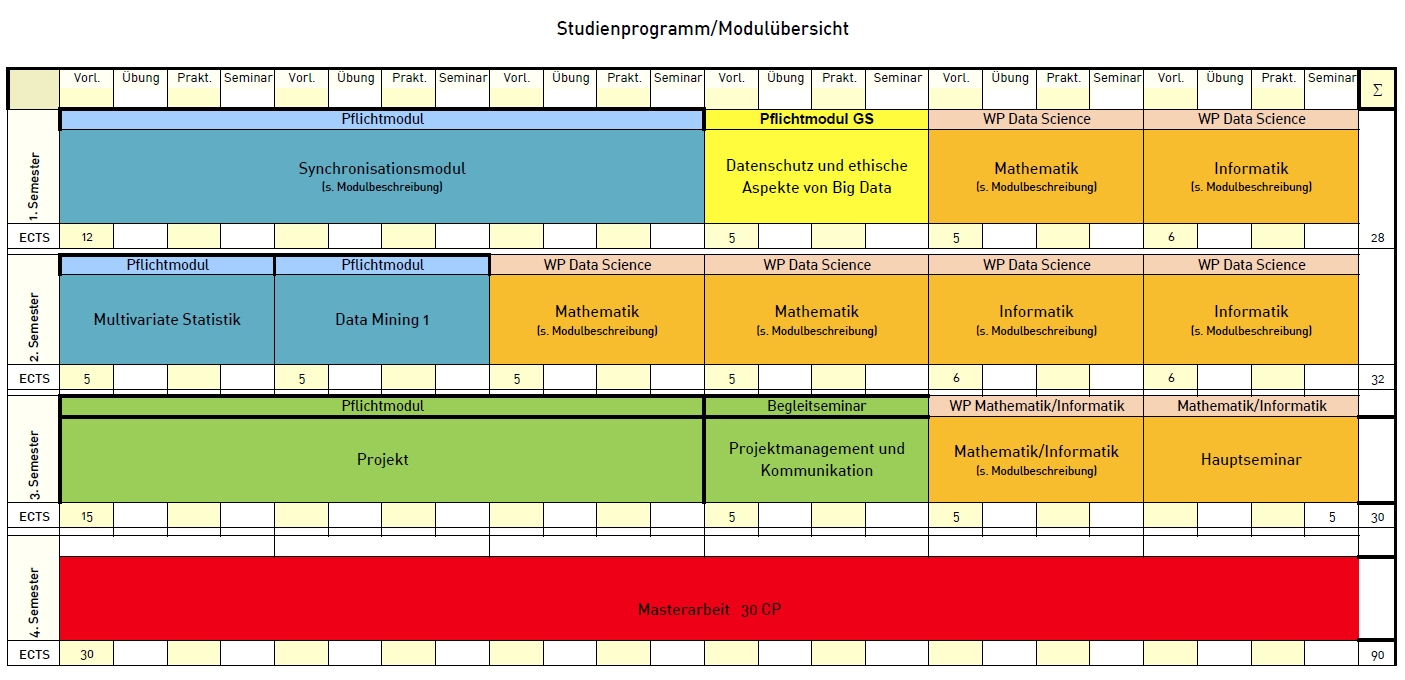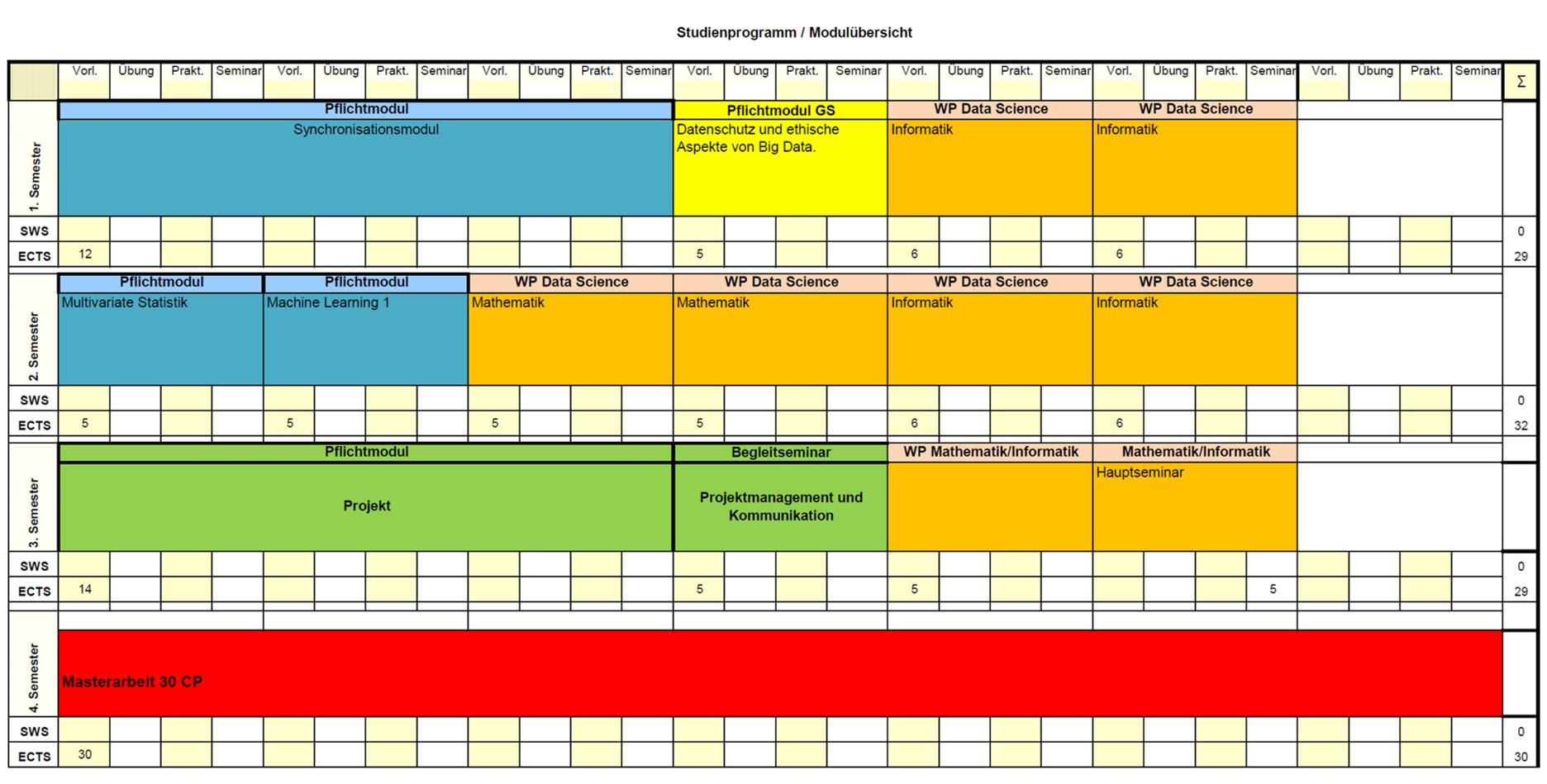Data Science (Master)
Field of practice for Data Scientists. What professional opportunities open up?
Data Scientists are highly sought after on the job market. Graduates of the Master's program encounter excellent job opportunities, for example, as analysts, consultants, system architects, in management and in academia. They are needed in many industries, such as:
- Banks and insurance companies
- Trading companies
- Management and organizational consultancies, market research companies
- Social media, telecommunications, online retail and network management
- Logistics
- Healthcare, bio, pharmaceutical, chemical and medical industries
Journalist Martin Hubert talks to professors Sebastian Döhler, Markus Döhring and Armin Malcherek at the beginning of the third part of his radio feature "My body, my data". It is about artificial intelligence and the limits of the application of Big Data methods in healthcare, about the critical handling of their results(to the podcast via chartable).
Admission requirement for the master's program Data Science is a qualified bachelor's or diploma degree in the field of mathematics or computer science or comparable degrees with an overall grade of 2.5 or better. Applicants who do not achieve the overall grade of 2.5 but have graduated with an overall grade of 2.9 or better may be admitted on the basis of a case-by-case examination (aptitude test). A detailed description of the admission requirements can be found in the Special Provisions of the Examination Regulations (BBPO).
For applicants who do not have a degree in mathematics or computer science, synchronization modules in mathematics and computer science are mandatory. With this concept, lateral entrants can also complete the master's program in Data Science.
The master's program in Data Science is divided into four semesters.
In the first semester, the students, who come from different bachelor's degree programs, are brought up to a uniform level of knowledge in a synchronization module. If both synchronization modules have to be completed as a requirement, "Data Protection and Ethical Aspects" should also be taken in the first semester and "Explorative Data Analysis" as a maximum. It is not recommended to take additional courses due to the CP/workload, also because they are based on the previous knowledge of the synchronization modules. Note: often the requirement of both synchronization modules extends the duration of study by one semester. Further details can be found in the module handbook.
Lectures with exercises and computer practicals, seminars and an extensive practical project are supplemented by courses on the ethical aspects of Big Data, project management and communication.
The elective modules that can be taken are distributed over the following catalogs (see also Module manual):
- Elective catalog DS-M
- Elective catalog DS-M-I (M-part)
- Elective catalog DS-I
- Elective catalog DS-M-I (I-part)
Be sure to familiarize yourself with the Module Handbook and Examination Regulations before beginning your studies:
Examination Regulations 2022
- ExaminationRegulations Master Data Science
- Module Handbook Master Data Science
The official documents of the current version of the BBPO and the Module Handbook were published in the University Gazette 2022.
Examination Regulations 2016 (expiring)
- Examinationregulations (in the 2018 updated version incl. study program, elective catalogs, laboratory regulations, practical regulations)
- Module handbook (in the 2018 updated version)
The official documents of the current version of the BBPO and the Module Handbook were published in the 2018 University Gazette.
The master's degree program in Data Science can also be taken as a dual Master can be studied. The dual study program variant is characterized above all by a flexible alternation between the study courses at the university and the practical phases and work activity in the partner company.
Once you have started your studies, these are probably the most important pages:
The link my.h-da (is also stored under Quicklinks) takes you to the university information system for students. Here you can
- print out all the certificates you need yourself (study certificates, Bafög certificate and the receipt for the fees you have paid).
- view information about your exams and grades
- register for or deregister from exams.
- register for courses.
- view your course schedule and the course catalog.
- compile your individual timetable.
At www.h-da.de/tutorials you will find brief instructions for registering for exams, viewing grades, and much more.
Semester dates: Here you can find the dates for exams and events for all courses of study. This page can also be accessed directly via quicklinks.
Timetables: This page contains the links to the PDFs with the current timetables for all degree programs.
The first point of contact for most questions about studying is the Student Service Center. In addition to general student advice and information on the details of the application process, advice on organizing or financing your studies is also available here: www.h-da.de/ssc.
Special features of the Data Science Master's program
Course enrollment is different for mathematics and computer science:
- For Computer Science, you will also receive access data for the online receipt system.
- For the mathematics courses, no voucher is generally required (exceptions are seminars and projects). Information on enrollment in associated moodle courses will be communicated by the respective lecturers.
- Please note the deadlines for enrollment in computer science courses.
If you have to take both synchronization modules as a requirement, you should still take "Data Protection and Ethical Aspects" in the first semester and at most additionally "Exploratory Data Analysis". It is not recommended to take additional courses due to the CP/workload, also because they are based on the previous knowledge of the synchronization modules. Note: often the requirement of both synchronization modules extends the duration of study by one semester.
Applications for the dual study program variant should be sent directly to the desired partner companies. After a successful application process, a student contract is concluded between the future student and the company. Subsequently, enrollment at the university is applied for. Further information can be found at www.h-da.de/dual.
We look forward to hearing from you!
Student Advisory Service
Prof. Dr. Antje Jahn
Department MN
+49.6151.533-68695
antje.jahn@h-da.de
Prof. Dr. Markus Döhring
Department I
Opening hours secretariat | |
|---|---|
Mon: | Appointment by arrangement |
Tue: | Appointment by arrangement |
Wed: | 9 am - 2 pm Open consultation hours |
Thu:: | 9 am - 2 pm Open consultation hours |
Fri: | Appointment by arrangement |


